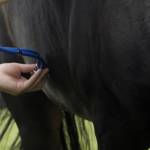Smoke Inhalation in Horses

Inhaling smoke from a burning barn, forest fire, grass fire, or even a campfire can injure the delicate tissues in a horse’s respiratory passages and lungs. Smoke contains toxic chemicals like sulfur dioxide, hydrogen cyanide, hydrogen sulfide, and ammonia. These substances, in addition to superheated gases, can lead to thermal and chemical irritation.
Soon after the horse has been exposed to smoke, tissue damage causes signs that include coughing, lethargy, elevated heart rate, nasal discharge, and fast, shallow breathing. Fluid may accumulate in the lungs and the horse may develop a fever. Pneumonia sometimes follows smoke inhalation.
Owners should have a veterinarian examine horses that have been exposed to smoke, and should watch for signs of disease or infection that may continue to develop for several weeks after the initial episode. Rest, antibiotics, and other treatments may be necessary in the months following serious cases of smoke inhalation.








